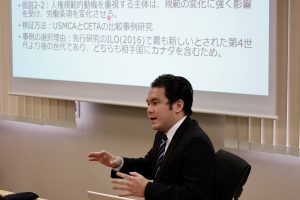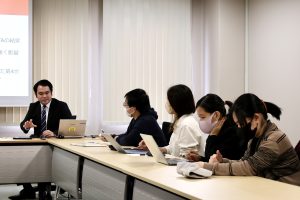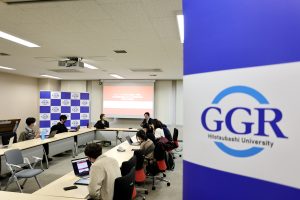On November 30, 2022, the Institute for Global Governance Research (GGR) held its 10th Brown Bag Lunch Seminar on “Trade and Labor in the Global Era: The Policy-Making Process of Labor Provisions in Free Trade Agreements” with Mr. Kazuhiro Fukazawa, a doctoral student at the Graduate School of Law and a research staff member at the Institute for Liberal Arts, Tokyo Institute of Technology. His paper on a comparative case study of the United States (U.S.) and European Union (EU) Free Trade Agreements (FTAs) was published in Economia in March 2022.
In his doctoral dissertation, Mr. Fukazawa has addressed the following two major questions: 1) Why do labor provisions vary from one contracting party to another; and 2) despite being an agreement by the same signatory countries, why do the labor provisions vary as the date of conclusion of the agreement changes. In response to the first question, Mr. Fukazawa considered that differences arise depending on the motives of the parties to the agreement in incorporating labor provisions, and conducted a comparative case study of the FTAs that the U.S. and the EU concluded with South Korea, respectively. He analyzed that both motives can be broadly divided into economic motives (domestic employment, impact on wages, etc.) and human rights norm motives (protection of workers’ rights). On the other hand, as to the second question, Mr. Fukazawa compared the U.S.-Mexico-Canada Agreement (USMCA) and Comprehensive Economic and Trade Agreement (CETA) as a method of verification, analyzing the social and economic impacts resulting from the already concluded FTAs and changes in norms, such as international labor standards, as a means of testing his hypothesis. Mr. Fukazawa explained that the two research hypotheses were supported by a contrastive analysis of trade condition–type labor clauses and policy cooperation–type labor clauses, as well as analysis of diversification factors of labor clauses that appear in recent cases.
While not all countries include labor clauses in their trade agreements, it is worth noting that as of 2016, labor clauses were found in about 28.8% of trade agreements, he said. After the lecture, around 11 people including professors and students asked questions and commented on whether it is appropriate to compare the U.S. and the EU or the USMCA and CETA as case selections, how labor standards differ between the two patterns of labor clauses, and the background that led to different motivations behind labor provisions.
【Event Report prepared by】
JEONG Minhee (PhD student, Graduate School of Law, Hitotsubashi University)



